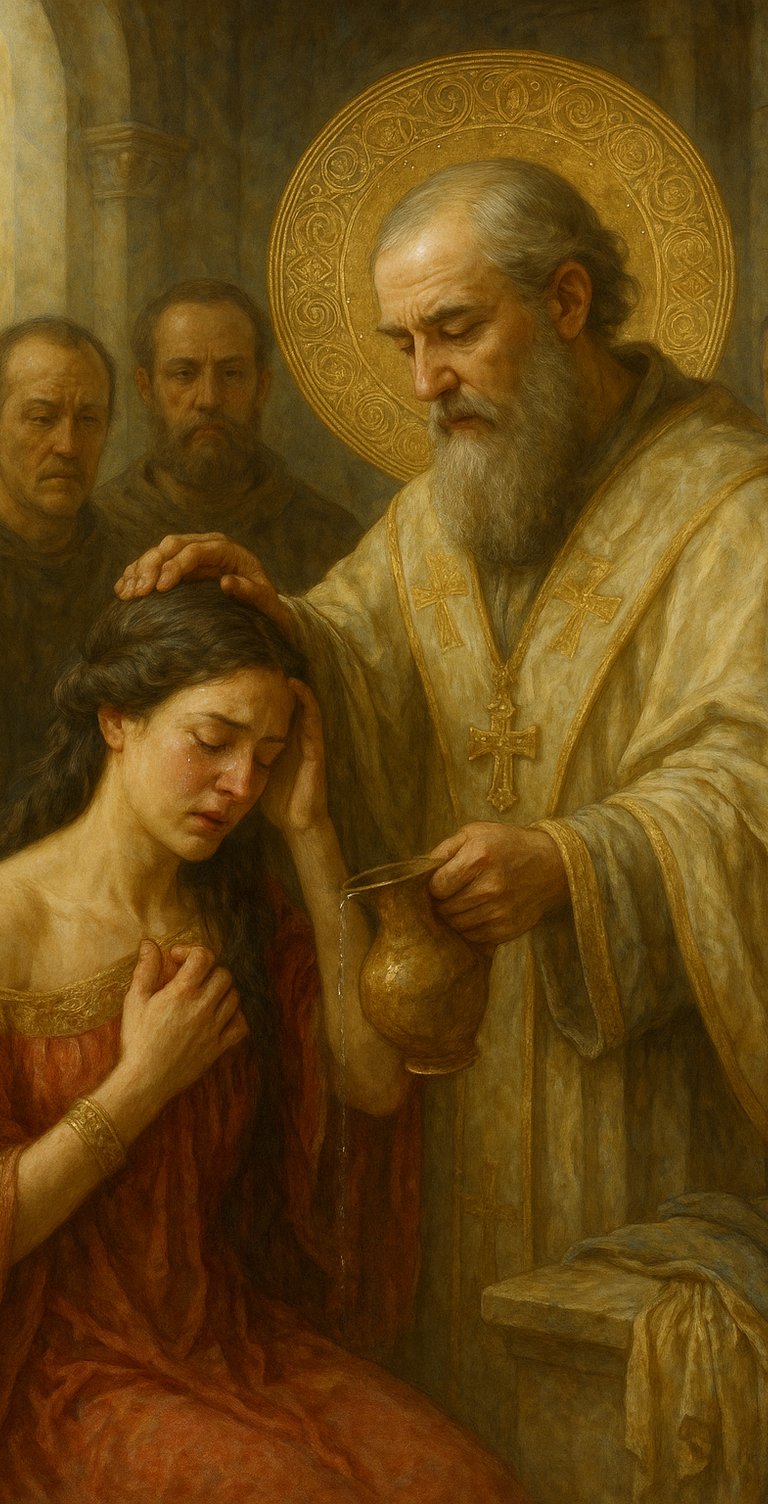St. Pelagia the Penitent – From the Stage of Sin to the Desert of Grace
Feast Day: October 8 | Patronage: Penitents, Converts, Women Seeking Forgiveness
Halo & Light Studios
10/9/20254 min read


Click Link for a reel of Daily Dose of Saints and Faithful Art:
https://youtube.com/shorts/Ufb3IAGlKcI?feature=share
In every age, God raises up unlikely saints to remind the world that His mercy is stronger than sin. In the glittering city of Antioch, in the fourth century, lived a woman whose beauty and fame made her the talk of the empire. Her name was Pelagia—an actress, dancer, and courtesan whose wealth and charm were legendary. Yet beneath the gold and perfume was a soul restless for something the world could not give.
Antioch, then one of the great cities of the Roman world, pulsed with luxury and temptation. Public games, theaters, and banquets overflowed with indulgence. Pelagia was at the center of it all—draped in jewels, admired by the powerful, adored by the crowds. Chroniclers describe her parading through the streets “adorned like a queen,” followed by slaves and perfumes that filled the air.
But when she passed by a church one morning, something extraordinary happened. Inside, Bishop Nonnus of Edessa was preaching on judgment, repentance, and the mercy of Christ. His sermon pierced through the noise of her heart like an arrow. The woman who had been a symbol of vanity suddenly wept, struck by divine light. She returned the next day to seek him out, confessing her sins publicly and asking to be baptized.
Moved by her repentance, Bishop Nonnus baptized her in the name of the Father, and of the Son, and of the Holy Spirit. The moment the water touched her forehead, the life she had known died forever. Pelagia gave away her entire fortune—her jewels, her silk robes, her houses—and freed all her servants.
“I am Christ’s servant,” she said. “Let the riches gained by sin become a wealth of righteousness.”
The woman who had once led others to temptation now became a herald of grace. She dressed in simple garments and withdrew from Antioch, seeking a new life far from the noise of the world.
Pelagia journeyed to Jerusalem, where she disguised herself as a man and took the name Pelagius. On the Mount of Olives, she built a small cell where she lived as a hermit—fasting, praying, and weeping for her past sins. The one who had once captivated the world with her beauty now hid her face from it, consumed not by vanity, but by love.
No one knew who she was. The brethren believed she was a holy monk. She ate only bread and water, prayed through the night, and was rarely seen. When a pilgrim visited her cell near the end of her life, he found her face shining with peace. After her death, they discovered her true identity—and the revelation astonished all of Jerusalem.
The courtesan of Antioch had become one of heaven’s great penitents.
The fourth and fifth centuries were turbulent times for the Church. Pagan customs still thrived in cities like Antioch; the Roman Empire was crumbling, and heresies like Arianism tore at Christian unity. It was an age of luxury and moral confusion—a world not unlike our own. Against this backdrop, Pelagia’s story became a mirror for the fallen soul and a beacon for conversion.
She embodied what the Fathers of the Church often taught: that repentance is not despair, but a second baptism, a rebirth of the soul in grace. St. John Chrysostom, himself from Antioch, often preached that the greatest sinner can become the greatest saint if they throw themselves into the mercy of God. Pelagia became living proof of that truth.
The Church commemorates St. Pelagia on October 8 in both East and West. The Byzantine hymns call her “the Righteous One,” celebrating her purity regained through tears. Her small hermitage on the Mount of Olives became a pilgrimage site for centuries.
Her story has inspired countless conversions, especially among women who felt lost or defined by their past. In her, they see hope—that the same God who drew Pelagia from vanity to virtue can restore any heart to beauty.
The life of St. Pelagia asks each of us uncomfortable questions:
What treasures or identities still bind us to the world?
Have we let Christ’s mercy reach the deepest part of our shame?
Do we truly believe that holiness can begin today, no matter yesterday’s sins?
Pelagia’s penance was not despair but joy—a joy born of freedom. Her beauty was no longer a snare but a reflection of the divine light that dwelled within her.
In her cell on the Mount of Olives, far from applause and applause’s echo, she learned the meaning of true love. The same Lord who once called Mary Magdalene called her too, whispering across centuries: “Go, and sin no more.”
If you have ever felt unworthy of God’s mercy, remember St. Pelagia.
If you have ever wondered whether grace can restore what was broken, remember her.
Her life proves that the Gospel is not a story for the pure, but for the repentant—those who dare to believe that Christ’s mercy is stronger than their past.
“I have been the enemy of Christ, but He has made me His friend.” — St. Pelagia the Penitent


